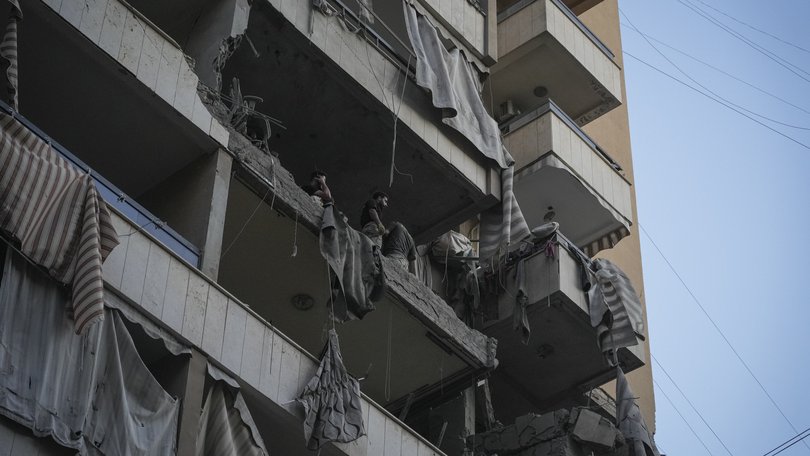NEW YORK TIMES: Israel says it assassinated a top Hezbollah commander near Beirut
Lebanon’s state-run news agency said at least five people were killed in the airstrike, which the Lebanese militant group says ‘breaches a new red line’.

The Israeli military assassinated a top Hezbollah commander in an airstrike near the Lebanese capital, Beirut, on Sunday, further escalating its attacks on the Iran-backed militant group despite a year-old ceasefire brokered by the United States.
Israel identified the commander as Haytham Ali Tabatabai, describing him as the Lebanese armed group’s military chief of staff. Hezbollah confirmed his death and mourned Tabatabai as a martyr and preeminent commander.
Lebanon’s state-run news agency said the strike targeted an apartment in Dahiya, a densely populated cluster of neighbourhoods on the outskirts of Beirut, where Hezbollah has long held sway. At least five people were killed in the airstrike and more than 25 were injured, according to the Lebanese Health Ministry.
Sign up to The Nightly's newsletters.
Get the first look at the digital newspaper, curated daily stories and breaking headlines delivered to your inbox.
By continuing you agree to our Terms and Privacy Policy.Israeli Prime Minister Benjamin Netanyahu said Tabatabai had been leading Hezbollah’s efforts to regroup after it was badly weakened during the war with Israel.
After Hamas attacked Israel on October 7, 2023, igniting the war in the Gaza Strip, Hezbollah began firing rockets and drones at Israeli cities and military bases in solidarity with its Palestinian allies. Both groups are backed by Iran. Israel and Hezbollah agreed to a ceasefire in November 2024.
“My policy is clear: Under my leadership, Israel will not allow Hezbollah to build its power anew and again constitute a threat,” Mr Netanyahu said in a televised statement Sunday night, hours after the attack.
Israel has sharply accelerated its strikes across Lebanon in recent weeks, accusing Hezbollah of exploiting the truce to rearm.
Hezbollah says it has withdrawn from southern Lebanon, in line with the ceasefire deal. But the attack Sunday took tensions to a higher level.
Mahmoud Kamati, the deputy head of Hezbollah’s political council, said in a statement that the Israeli attack “breaches a new red line,” though he did not immediately vow retaliation. He said the Israeli attack was proof that “agreements are useless with the enemy.”
“We are coordinating with the Lebanese state to put an end to this Israeli violation,” he added in the statement distributed by Hezbollah’s media office.
Lebanese President Joseph Aoun condemned the attack, writing on social media that Israel was rejecting “all the efforts and initiatives put forward to end to the escalation.”
Tabatabai had previously commanded Hezbollah’s special forces in operations across the region, including in Syria and Yemen, according to the US State Department, which had offered a reward of up to $US5 million for information on him.
The war with Hezbollah lasted for more than a year, with Israeli attacks killing more than 4,000 people in Lebanon and forcing more than 1 million from their homes. Hezbollah bombardments displaced tens of thousands of Israelis, turning some of the country’s northern communities into ghost towns.
Israel killed many of Hezbollah’s top leaders, including its long-time head Hassan Nasrallah. And while the group had vowed to keep fighting as long as Israel’s war in Gaza continued, it was badly weakened and eventually agreed to a ceasefire in November 2024.
The year since then, however, has been far from quiet.
Israeli soldiers are still deployed in parts of southern Lebanon. Israeli forces have bombarded sites across Lebanon almost daily, saying it was trying to prevent Hezbollah from rearming.
US and Israeli officials had hoped Mr Aoun, who assumed the Lebanese presidency this year, would crack down on Hezbollah, and the country’s new government has pledged to disarm all armed groups by the end of 2025.
But so far, Hezbollah has resisted calls to lay down its weapons, and Lebanon’s new government is hesitant to disarm the group by force, fearing it could ignite internal conflict. This has led US officials to express growing frustration with the pace of disarmament.
Assaf Orion, a retired Israeli brigadier general, said Israel appears to hope the Lebanese government took Tabatabai’s killing as a message: Start cracking down on Hezbollah in earnest, or face more attacks like the one Sunday.
The attack also let Hezbollah know that Israel still has the intelligence capabilities to take out senior leadership figures, said Brigadier-General Orion, who is also a fellow at the Washington Institute for Near East Policy.
“This seems to be a military move aimed at adding more political momentum for the Lebanese government to move ahead with disarmament, as part of the ceasefire,” he said. “But at the same time, it could deteriorate into a wider battle.”
This article originally appeared in The New York Times.
© 2025 The New York Times Company
Originally published on The New York Times
